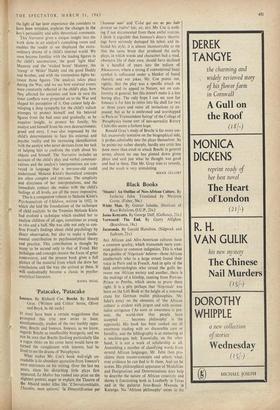'Patacake, 'Patacake
IT must have been a certain waggishness that Prompted this trim new series to issue, simultaneously, studies of the two loathly oppo- sites, Brecht and Ionesco. Ionesco, as we know, regards Brecht as insufferably bourgeois, and we can be sure that Brecht (looking particularly like a rogue rhino on his cover here) would have re- turned the compliment with interest, had he lived to see the drama of 'Pataphysics.
What makes Mr. Coe's book well-nigh un- readable is its abundant quotation from lonesco's own utterances on his writing. Over the last ten years, since his disturbing little plays first appeared, Le Maitre has rushed into print on the slightest pretext, eager to explain the Theatre of the Absurd under titles like `L'Invraisemblable, rinsolite, mon upivers,"la Demystification par l'humour noir' and 'Celui qui ose ne pas hair devient un traitre' (sic, sic, sic). Mr. Coe is noth- ing if not documented from these awful sources. I think it arguable that Ionesco's dreary theoris- ings have seriously damaged his talent and in- fected his style; it is almost inconceivable to me that the same brain that produced the early plays, in which words and characters had a mad, obsessive life of their own, should have declined in a handful of years into the tedium of Rhinoceros, where a strong if conventional basic symbol is suffocated under a blanket of banal rhetoric and wet jokes. Mr. Coe points out, rightly, that the play was a specific attack on Nazism and its appeal to Nature, not on con- formity in general; but this doesn't make it a less boring play. The only hope I can see now for Ionesco is for him to retire into his shell for two or three years and resist all invitations to ex- pound; but as he is enthroned and worshipped in Paris as Transcendent Satrap' of the College of Tataphysics (some sort of neo-surrealist Rotary Club) this seems a forlorn hope.
Ronald Gray's study of Brecht is far more use- ful; excessively tentative on the biographical side, it probes admirably into the plays themselves, As he points out rather sharply, hardly any critic has done more than extol or attack Brecht in general terms; almost no one has pinned down given plays and said just what he thought was good and bad in them. This Mr. Gray tries to remedy, and the result is very stimulating.
ROGER GELLERT


































 Previous page
Previous page